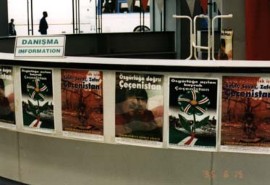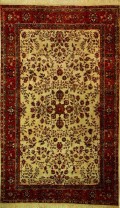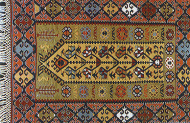

WHO ARE THE TURKS ?
"O Turkey ! how mild are thy manners, Whose grandest and highest
of men Are all proud to be rhymers and scanners, And wield
the poetical pen !"
Thomas Hood, Poetry, Prose, and Worse, 1836
"A real Turk is a manly, though rather violent, kind-hearted being,
and if he has confidence in you, very easy to deal with."
Lady Stanhope, October 1827
"A humorless soldierly people whose arts are courage, honor, and
bloodletting."
Nelson Algren, Who lost an American ?, 1963
Where do they come from ?
The Turks first came from the wide plains of Central Asia. These nomadic
horsemen migrated westwards, converting to Islam along the way, until they
finally reached Anatolia. In 1071, the Byzantine Emperor Romanus IV Diogenes
was defeated by the Seljuk Turks at the Battle of Manzikert, and thus opened
the way for Turks into Asia Minor. Even today, the Turks have not forgotten
the ethnic cousins they left behind in Central Asia - the Azerbaijanis,
Kazaks, Uzbeks, Turkmens, Kyrgyzs, Ugyur as well as smaller groups like
the Chechens, Gagauz, etc. The downfall of the Soviet Union has left to
a rise of a feeling of Pan-Turkism - that of the unity of Turkic peoples...the
Turkish government is pouring aid into the former Soviet republics, and
Turkish businessmen are rushing in. The plight of the many wars and conflicts
in these lands are also attracting the attention of the Turkish people,
for example, the Chechen conflict - when I was in Ankara, there was an
ongoing campaign in support of the Chechen struggle for independence from
Russia...or the rights of the Turkish Cypriots...the Western Tracian Turks...

"Support Chechenya !" (Cecenistan) posters at Ankara Bus Terminal
To find out more about these Turkic nations, visit Sota,
a Netherlands-based research centre for Turkestan and Azerbaijan. Its Web
page has links related to pages of Turkish peoples and communities; e.g.,
Turkey, Azerbaijan, Chechenia, Turkmenistan, etc. There are also links to
history and culture of Turkish peoples ; Or go to The
Russian and East European Studies Virtual Library - a great resource
site from the University of Pittsburgh ; Updated monthly.

Normads of the East
Turkish hospitality
The hospitality of the Turkish people is legendary. Everywhere I was
invited to have tea and chat with the locals - even from people who can
hardly speak English. All of them are so friendly to tourists, and would
do whatever possible to assist foreign visitors. I often have to turn these
friendly people down, due to time constraints and my fear of falling victim
to crime ( - there have been a number of reports of schemes by some of
the unscrupulous elements of the population, to exploit this well known
hospitality of the Turkish people in general to drug and rob tourists).
A tourist therefore has to be careful and decide when it is safe to accept
the drinks and so on. Personally, I only accept drinks in open areas, and
try to avoid wandering into remote areas with strangers.
Turkish Islam
Once devoted Muslims, the Turkish of today are very liberal people.
Since the abolition of the Caliphate in 1923, Islam is no longer the driving
force of Turkish life. Despite a resurgence of Islam in recent years, most
Turks still regard religion as essentially a private affair - not something
one should mix with politics. Just take a look at an Istanbul magazine
stand or watch the Turkish TV - one could hardly believe this is a Muslim
country. One finds Turkish edition of the Playboy and Penthouse, and the
TV is full of Turkish music video just like that of any other country -
with all the non-Islamic rap and so on... But Turkey is a country of great
contrasts - while Istanbul is full of infidel pleasures like discos and
pornography newsstands, the East is another country - one where Islam is
the order of the day, and the imam's call for prayers is taken seriously...

Turkish Cuisine
The Turks are fond of comparing their cuisine to that of the Chinese
and the French, and claimed that these three are the greatest cuisines
in the world. Although I hesitate in agreeing entirely with this saying,
I have to rank it as one of the best. For indeed, the unique geographical
location of Turkey as the crossroads of the East and West, as well as the
long migratory history of the Turkish tribes, have bestowed this nation
a rich and varied cuisine. In addition was the imperial heritage of the
Ottoman court, which had not only acquired territories from afar, but acquired
taste of diverse cuisines and cooking methods from all corners of the empire.
My first encounter with Turkish cuisine was at a coach meal stop
near Edirne, where rice and various Turkish dishes are displayed. One points
the dishes one desires, and they will either be served with rice or with
bread. (Anyone who has been to Southeast Asia will find that these stalls/shops
resemble the Indonesian "nasi padang", or the Chinese "mixed
vegetables rice".) The whole meal will cost around US$4 to US$7 and
it offers one an uncostly insight into this rich cuisine. In addition,
as an Asian, I was most delightful to come to a country where rice is a
staple again...
The most famous Turkish dish is perhaps the kebab, sticks
of grilled mutton or beef (a little like the Malay "satay"). The
ordinary Turkish worker has kind of a "kebab burger" for lunch everyday
- the Turkish version of fast food. I have this pretty often, when I'm
rushing for time and do not want to have a formal meal. (The Turks find
the spicy Adana kebab the best, but I find it too salty.) Another great
category of Turkish dishes is the dolma, or stuffed vegetables -
rice, meat or indeed, any imaginable ingredient is being staffed in vegetables
like the eggplant/aubergine, tomatoes, cabbages and so on. And of course,
the list goes on. Visit Yusuf's
Turkish food page site or Turkish
Cuisine & Receipes to explore the Turkish cuisine.
Everyone has heard of the Turkish coffee but one hardly finds it
in Turkey since the loss of coffee-producing Arabia and Yemen in the early
part of this century. Instead, one finds tea, or chai, everywhere.
One hardly passes a day without being offerred chai. These are drank
in tiny glasses and is drank without milk. Some Turks drink more than 10 glasses (possible because the glasses are small as well) on an average day...

 Homage
to Istanbul - Glories of the Ottomans
Homage
to Istanbul - Glories of the Ottomans
 Back
to TWC's Mad Rush Homepage
Back
to TWC's Mad Rush Homepage
 TWC's
Homepage
TWC's
Homepage  Please
email your comments to weecheng@post1.com
Please
email your comments to weecheng@post1.com





![]() Homage
to Istanbul - Glories of the Ottomans
Homage
to Istanbul - Glories of the Ottomans
 Back
to TWC's Mad Rush Homepage
Back
to TWC's Mad Rush Homepage
 TWC's
Homepage
TWC's
Homepage  Please
email your comments to weecheng@post1.com
Please
email your comments to weecheng@post1.com